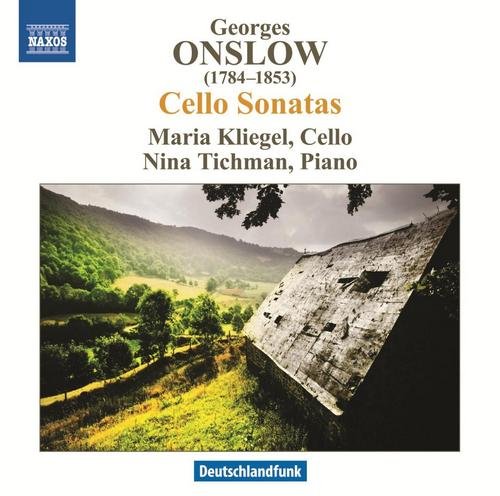
Maria Kliegel, Nina Tichman - Georges Onslow: Cello Sonatas (2013)
BAND/ARTIST: Maria Kliegel, Nina Tichman
- Title: Georges Onslow: Cello Sonatas
- Year Of Release: 2013
- Label: Naxos
- Genre: Classical
- Quality: FLAC (image+.cue,log,booklet)
- Total Time: 71:00
- Total Size: 274 Mb
- WebSite: Album Preview
Tracklist:
Georges Onslow (1784–1853)
[1]-[3] Sonata in F major, Op. 16, No. 1
[4]-[7] Sonata in C minor, Op. 16, No. 2
[8]-[10] Sonata in A major, Op. 16, No. 3
Performers:
Maria Kliegel, cello
Nina Tichman, piano
Georges Onslow (1784–1853)
[1]-[3] Sonata in F major, Op. 16, No. 1
[4]-[7] Sonata in C minor, Op. 16, No. 2
[8]-[10] Sonata in A major, Op. 16, No. 3
Performers:
Maria Kliegel, cello
Nina Tichman, piano
These very agreeable works will find immediately receptive ears among fans of early-romantic chamber music. And indeed, Georges Onslow was quite adept at writing for various chamber configurations—34 string quintets, 35 quartets, six piano trios, a sextet, septet, and nonet, and sonatas for piano, violin, cello, and numerous solo piano pieces.
The three cello sonatas on offer here show a sure-handed mastery of cello idiom (Onslow played the instrument) and a facility for composition that gives equal voice and musical interest to both cello and piano. And while there is nothing here to justify a re-shuffling of the composer hierarchy of the first decades of the 19th century (comparisons to Beethoven regarding style and formal technique certainly have merit, but no one will confuse the two composers when it comes to sheer invention or to the manner in which new ideas were applied in a given context, in this case, cello sonatas), neither is there reason to relegate these sonatas to second-tier status: these are substantial works as demanding technically to the performer as they are immediately attractive to the ear of the listener. The opening movement of the A major sonata is a masterfully written, engaging dialogue worthy of a place alongside any contemporary works in the genre; the Adagio cantabile of the C minor sonata is a magnificently lovely creation, which you could actually imagine fleshed out as a movement from a Beethoven string quartet.
Happily for Onslow, and for us listeners, all of this is realized by two very competent and obviously devoted performers, cellist Maria Kliegel and pianist Nina Tichman, who work together in stylistic accord and with just enough individual interpretive freedom to ensure a lively interactive dynamic. The well-balanced, vibrant sound, from Cologne, Germany’s Deutschlandfunk Kammermusiksaal, places the instruments in an ideal, intimate space. Strongly recommended. -- David Vernier
The three cello sonatas on offer here show a sure-handed mastery of cello idiom (Onslow played the instrument) and a facility for composition that gives equal voice and musical interest to both cello and piano. And while there is nothing here to justify a re-shuffling of the composer hierarchy of the first decades of the 19th century (comparisons to Beethoven regarding style and formal technique certainly have merit, but no one will confuse the two composers when it comes to sheer invention or to the manner in which new ideas were applied in a given context, in this case, cello sonatas), neither is there reason to relegate these sonatas to second-tier status: these are substantial works as demanding technically to the performer as they are immediately attractive to the ear of the listener. The opening movement of the A major sonata is a masterfully written, engaging dialogue worthy of a place alongside any contemporary works in the genre; the Adagio cantabile of the C minor sonata is a magnificently lovely creation, which you could actually imagine fleshed out as a movement from a Beethoven string quartet.
Happily for Onslow, and for us listeners, all of this is realized by two very competent and obviously devoted performers, cellist Maria Kliegel and pianist Nina Tichman, who work together in stylistic accord and with just enough individual interpretive freedom to ensure a lively interactive dynamic. The well-balanced, vibrant sound, from Cologne, Germany’s Deutschlandfunk Kammermusiksaal, places the instruments in an ideal, intimate space. Strongly recommended. -- David Vernier
Classical | FLAC / APE | CD-Rip
As a ISRA.CLOUD's PREMIUM member you will have the following benefits:
- Unlimited high speed downloads
- Download directly without waiting time
- Unlimited parallel downloads
- Support for download accelerators
- No advertising
- Resume broken downloads


